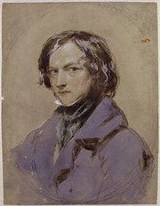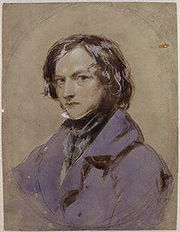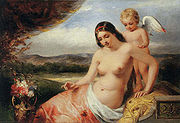
William Edward Frost
Encyclopedia


Victorian era
The Victorian era of British history was the period of Queen Victoria's reign from 20 June 1837 until her death on 22 January 1901. It was a long period of peace, prosperity, refined sensibilities and national self-confidence...
. Virtually alone among English artists in the middle Victorian period, he devoted his practice to the portrayal of the female nude.
Frost was educated in the schools of the Royal Academy
Royal Academy
The Royal Academy of Arts is an art institution based in Burlington House on Piccadilly, London. The Royal Academy of Arts has a unique position in being an independent, privately funded institution led by eminent artists and architects whose purpose is to promote the creation, enjoyment and...
, beginning in 1829; he established a reputation as a portrait painter before branching into historical and mythological subjects, including the sub-genre of fairy painting
Fairy painting
Fairy painting is a genre of painting and illustration featuring fairies and fairy tale settings, often with extreme attention to detail. The genre is most closely associated with the Victorian era in Great Britain, but has experienced a contemporary revival...
that was characteristic of Victorian art. In 1839 he won the Royal Academy's gold medal for his "Prometheus Bound," and in 1843 he won a prize in the Westminster Hall competition for his "Una Alarmed by Fauns" (a subject from Spenser's
Edmund Spenser
Edmund Spenser was an English poet best known for The Faerie Queene, an epic poem and fantastical allegory celebrating the Tudor dynasty and Elizabeth I. He is recognised as one of the premier craftsmen of Modern English verse in its infancy, and one of the greatest poets in the English...
The Faerie Queen). He was elected an associate member of the Royal Academy
Royal Academy
The Royal Academy of Arts is an art institution based in Burlington House on Piccadilly, London. The Royal Academy of Arts has a unique position in being an independent, privately funded institution led by eminent artists and architects whose purpose is to promote the creation, enjoyment and...
in 1846, and a full member in 1870.
Frost is widely recognized as a follower of William Etty
William Etty
William Etty was an English painter, best known for his paintings of nudes.-Beginnings:In accordance with the wishes of his father, Etty served seven years of apprenticeship to a printer in Hull...
, who preceded him as the primary British painter of nudes in the second quarter of the nineteenth century. Despite the prudishness of the Victorian era, Frost's relatively chaste nudes were popular, and his career was financially successful.
"At their best Frost's works have a distinctive jewel-like charm, his attractive young women models possessing a pert, self-conscious quality which makes them more titillating than Etty's powerful studies...."

